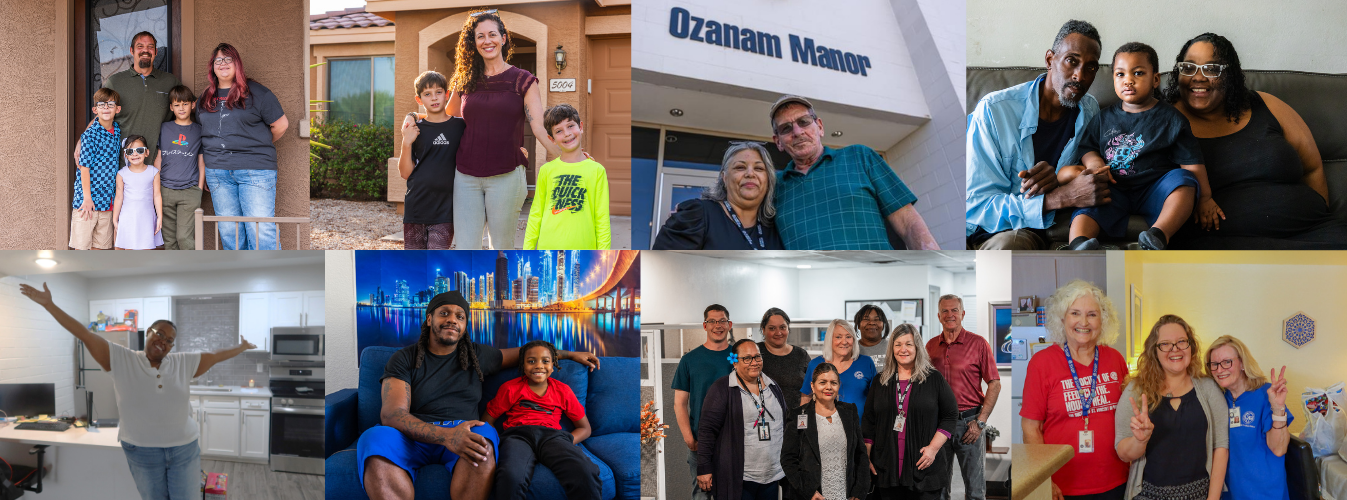
Housing 2025.
SVdP surpassed its Housing 2025 goal, more than doubling its impact with a prevention-first approach designed to stop homelessness before it starts.
In early 2025, SVdP committed to a bold goal: It would prevent homelessness for 12 people for every person it rehoused who was experiencing homelessness. The 12:1 goal set a prevention-first approach designed to stop homelessness before it starts.
By the end of 2025, SVdP exceeded its goal by more than doubling its prevention impact:
- 39,231 individuals prevented from experiencing homelessness through bill assistance and stabilization services
- 1,173 individuals rehoused into permanent housing after experiencing homelessness
That calculates roughly to a 33:1 ratio, meaning SVdP prevented homelessness for 33 people for every one person rehoused.
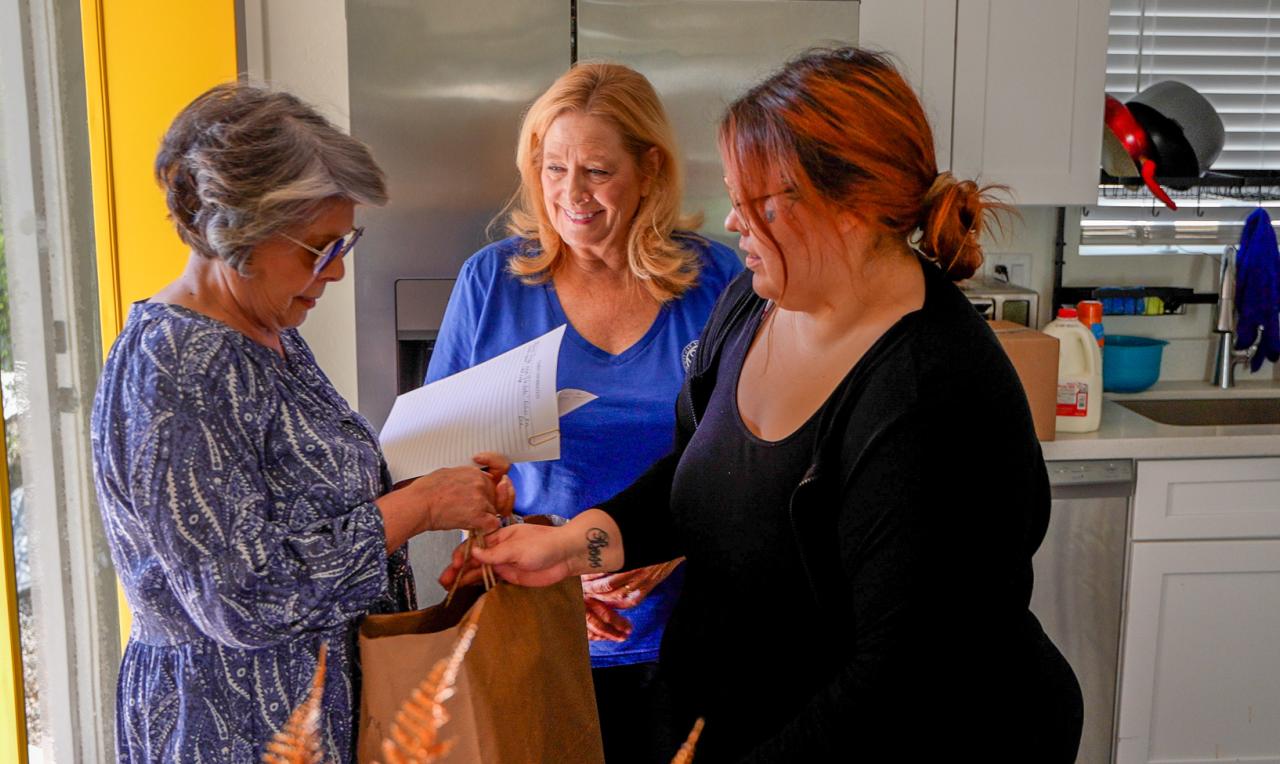
Our Focus
Preventing families from having to experience homelessness and the emotional trauma and “life recovery” challenges that go with it. We are keeping families in their homes with one-time assistance for rent, mortgage and utility bills. Our goal is for every individual that we help rehouse, that we keep four in their homes, helping to reverse the rise in homelessness that we’re seeing in Arizona.
Homelessness Outpacing Rehousing
According to the Maricopa Association of Governments, right now in Maricopa County, there are more people entering homelessness than exiting. According to the report, for every 10 people rehoused, approximately 19 people enter homelessness (roughly a one to two ratio). We know how to end homelessness, but we can’t do it fast enough.
Rise in Evictions
There were 86,947 evictions filed in Maricopa County in 2024, a 36% increase from the average number of annual evictions filed prior to the COVID-19 pandemic according to Eviction Lab tracking.
One-time Assistance Works
Notre Dame’s Lab for Economic Opportunity (LEO) published a study on the effectiveness of Homelessness Prevention Emergency Financial Assistance (EFA). LEO found that “people offered EFA [average amount $2,000] were 81 percent less likely to become homeless within six months of enrollment and 73 percent less likely within 12 months.”
Cost of Rehousing Compared to Prevention
At SVdP, we estimate that a low-income household living paycheck-to-paycheck needs $2,000 to avoid homelessness during a crisis. $2,000 can prevent the much larger cost of homelessness, which averages $43,600 per year per person for shelters, food, case management, trips to the ER, stays in jail/prison, etc. according to a study conducted by the Common Sense Institute. In addition, the loss of dignity and safety—particularly for children who also face learning loss and emotional trauma—remains ever-present for a lifetime and is often a predictor for future homelessness.
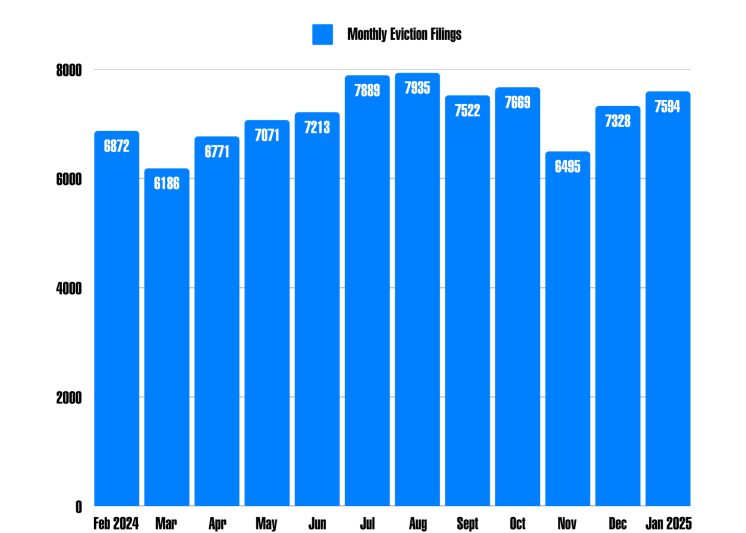
The numbers are in: Evictions in Maricopa County are at the highest levels since before the Great Recession with just under 8,000 evictions in January 2024 alone, and there were more than 85,000 over the course of 2024. These numbers have been rising since the pandemic and the end of the eviction moratorium, and they are concerning, especially since they coincide with the rising rates of homelessness throughout the Valley.
So, the natural question emerges: What is causing so many evictions? That's what SVdP wanted to find out, so we sat down with Maxine Becker, a former attorney advocate for Wildfire, to get down to the root of the problem.
SVdP Prevents Homelessness Through
For those living paycheck to paycheck a medical emergency or loss of a job can often lead to crisis. St. Vincent de Paul helps make sure that crisis does not lead to homelessness by providing direct assistance to our neighbors in need. We work with other agencies to co-fund utility assistance to help keep the power on, especially in the dangerously hot summer months, and rent and mortgage assistance to help families avoid an eviction.
Our community food pantries are historically called "Conferences of Charity" in the tradition St. Vincent de Paul. There are more than 80 community food pantries based out of Catholic churches throughout central and norther Arizona, each responds to needs within its neighborhood regardless of the individual's faith tradition, beliefs, and background. They are 100% volunteer-run and are true grassroots efforts of neighbors helping neighbors through food boxes, thrift store gift cards, rent and utility bill assistance.
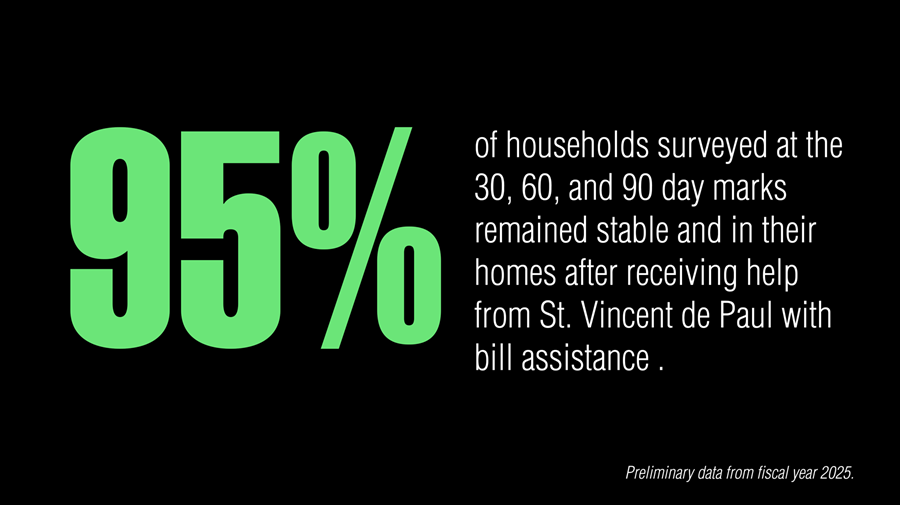
Eviction prevention works.
After helping nearly 300 households in fiscal year 2025, St. Vincent de Paul's Homelessness Prevention team surveyed the individuals and families at the 30, 60 and 90 day marks after they had received one-time bill assistance.
95% of the households who responded remained stable and in their homes without threat of eviction.
These families needed stop-gap assistance and have now continued on with their lives pursuing their professions and dreams.
While SVdP's survey results are preliminary, they echo similar findings in published research out of Notre Dame’s Lab for Economic Opportunity (LEO), which studied the effectiveness of Homelessness Prevention Emergency Financial Assistance (EFA). LEO found that “people offered EFA [average amount $2,000] were 81 percent less likely to become homeless within six months of enrollment and 73 percent less likely within 12 months.” The study backs that targeted prevention is successful in stopping homelessness before it starts.
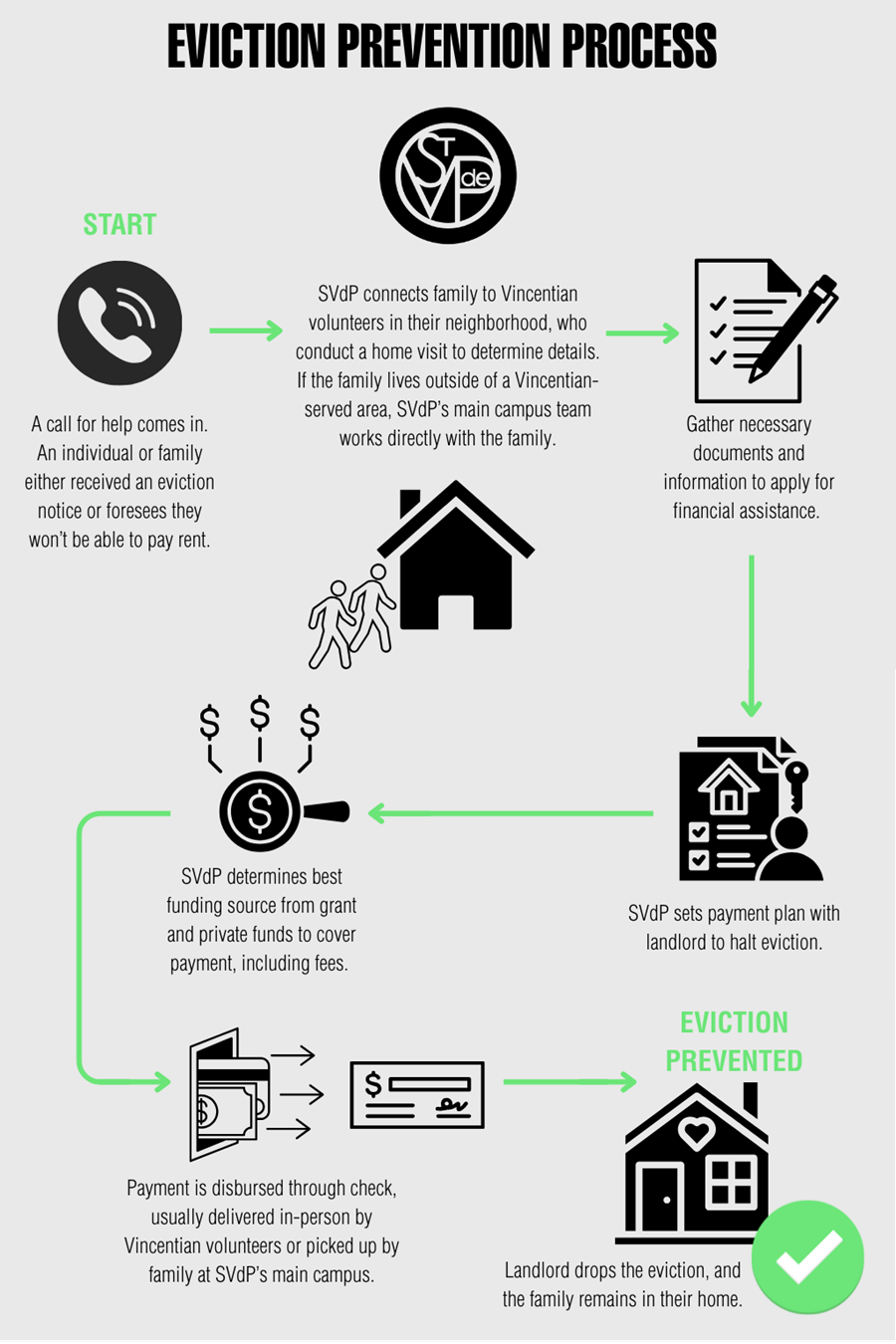
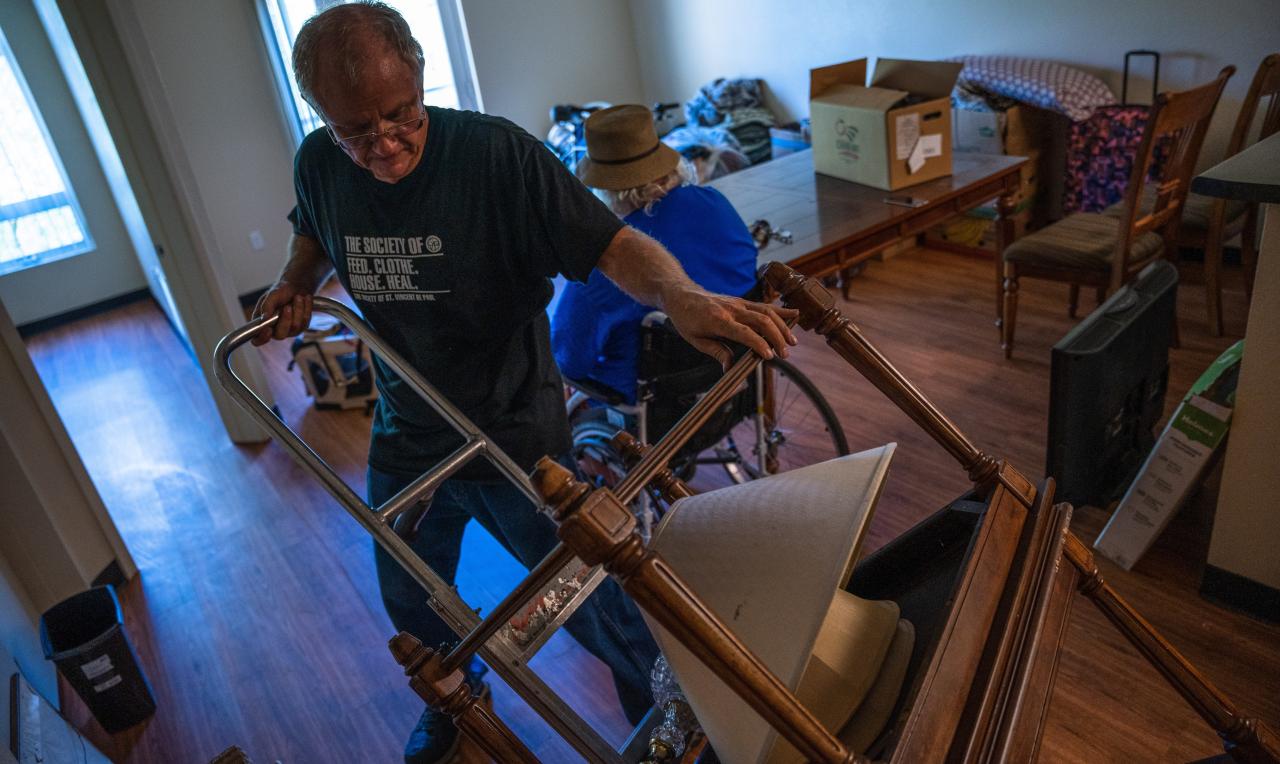
Our Focus
Moving people into permanent housing (not shelter, not transitional housing, not temporary housing). We are moving people HOME. This increases SVdP's permanent rehousing rate by 20%. While we work on all kinds of rehousing, this goal looks to increase specifically permanent rehousing so that people are less likely to return to homelessness. We hope to rally the community around a shared goal and invite people to do their part in helping address the homelessness they see.
Increase in Homelessness
There has been a 29% increase in Arizona’s homelessness population from January 2020 to the same month in 2023 according to an Arizona Department of Economic Security report.
Housing Shortage
As of 2022, it was estimated that Arizona had a deficit of 133,684 affordable and available units for extremely low-income households and a deficit of 183,072 units for low income households. A scarcity of affordable housing, paired with Arizona’s booming population growth, has been driving up rental prices and forcing people out of their homes.
Rent Has Increased
Rent prices in Arizona increased 72% from 2010 to 2022 according to the State of Arizona Housing report released by the Arizona Research Center for Housing Equity and Sustainability. At the time of the report, the median rental price for a one-bedroom unit in Arizona was $1,287.
Cost Burdens
Minimum wage in Arizona is not keeping up with rent prices. Workers making minimum wage would need to work 86 hours a week to reach the annual income needed, $62,252, to afford a two-bedroom home. And in 2022, nearly half of all renters were cost-burdened, meaning they were paying more than 30% of their income towards housing according to the State of Arizona Housing report.
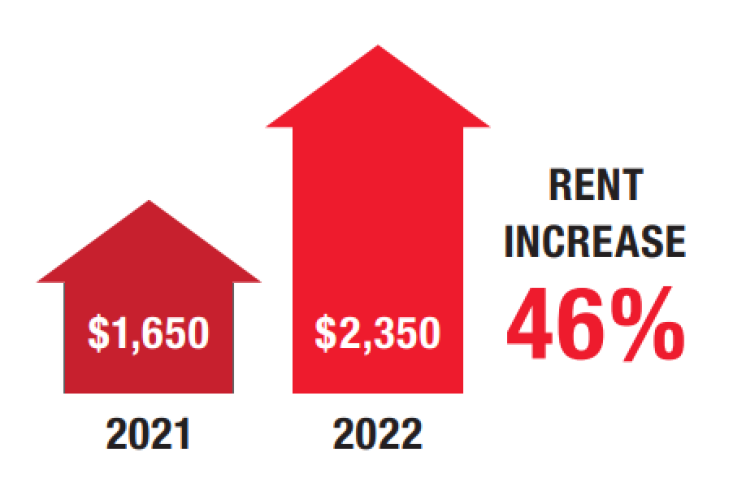
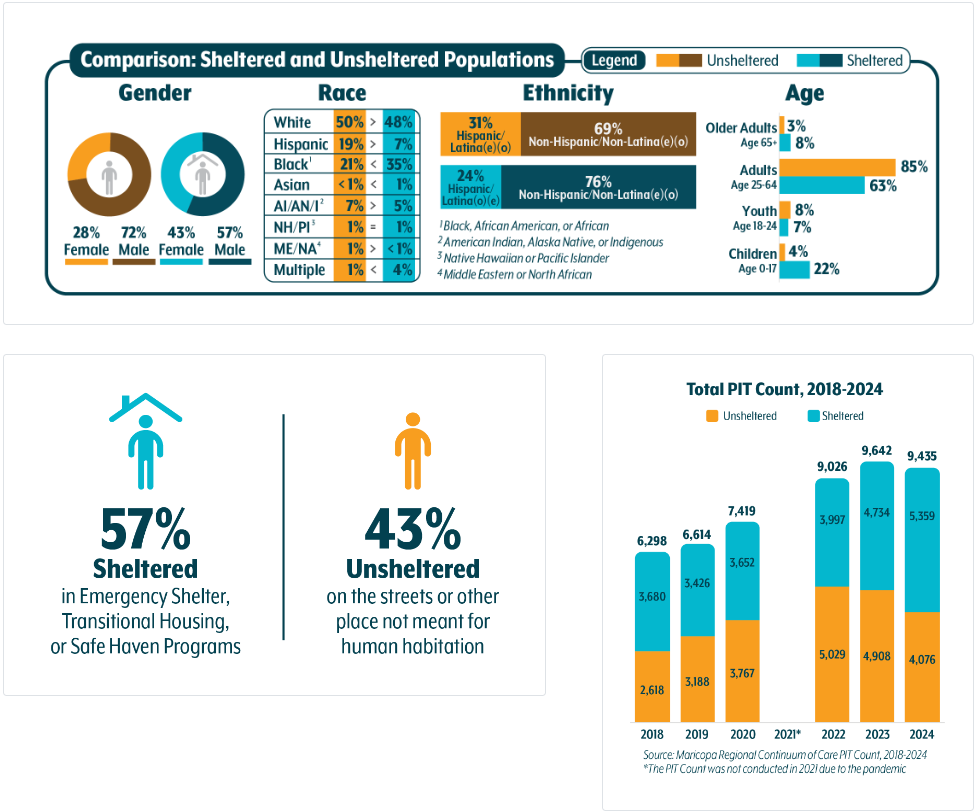
Every January, Maricopa County Association of Governments conducts the Point-in-Time (PIT) Homelessness Count of all those living on the street and in shelter to determine the number of people experiencing homelessness in Maricopa County during a given point in time. While it is impossible to count every person, especially those couch surfing, it does provide a snapshot of homelessness in our community. The PIT Count happens each January and results of the count are expected in the summertime.
Ride along with St. Vincent de Paul volunteers as they help conduct the annual Point-in-Time count.
SVdP Rehouses People Through
Named after the founder of St. Vincent de Paul, Ozanam Manor is our transitional housing program with 60 beds for seniors, veterans and adults with disabilities–a population that continues to fall into homelessness as fixed incomes struggle to keep pace with medical needs and rising costs. A dormitory-style shelter, each resident has their own bed and dorm area while living in community. They participate in group activities, have access to life courses, volunteer and meet one-on-one with case managers to work toward independent living, stabilizing health and moving into a home of their own.
With more than 200 beds, the Washington Street shelter serves as a pipeline to housing with intense wraparound services to end homelessness in its direct neighborhood and downtown. Each resident’s bed is their own until they secure housing. Open day and night, the shelter provides three meals a day, showers and basic needs, while also connecting residents to case management, mental health support, substance abuse services, as well as workforce readiness and volunteering opportunities. The program welcomes people ready and willing to get off the street and rediscover stability and life as a productive citizen again.
St. Vincent de Paul has the distinction of being a leading partner in opening and operating The Washington Street Shelter, which is set to be the model on which additional Valley pocket shelters will be based as the City of Phoenix and Maricopa County aim to decentralize homelessness services.
Learn more about our Washington Street shelter and what makes it unique from other shelter models.
In the middle of homelessness, it can feel overwhelming not knowing next steps and who to trust as individuals and families try to regain housing. Our Social Work Services team offers care and case management to help individuals and families find their path off the street. With a dedicated case manager and wraparound services, the Social Work Services team helps identify barriers and motivates people to work toward achievable goals. They provide connection to mental health resources and trauma support as well as financial assistance with application fees, deposits, bill and rent payments. Whatever it takes to get someone housed, the Social Work Services team is ready to help people exit homelessness for good.
Our dining rooms serve more than just a hot meal. They present an opportunity for us to work with individuals to address some of the core issues preventing them from regaining house. By bringing a multitude of wraparound services to each of our different dining room locations, our dining room staff is able to work with individuals to address mental health, substance abuse, workforce development obstacles and so much more to help offer people hope and a real chance at getting off the street.
Read more: Diriki Lewis never expected housing help when he walked into Mesa Dining Room for a hot meal
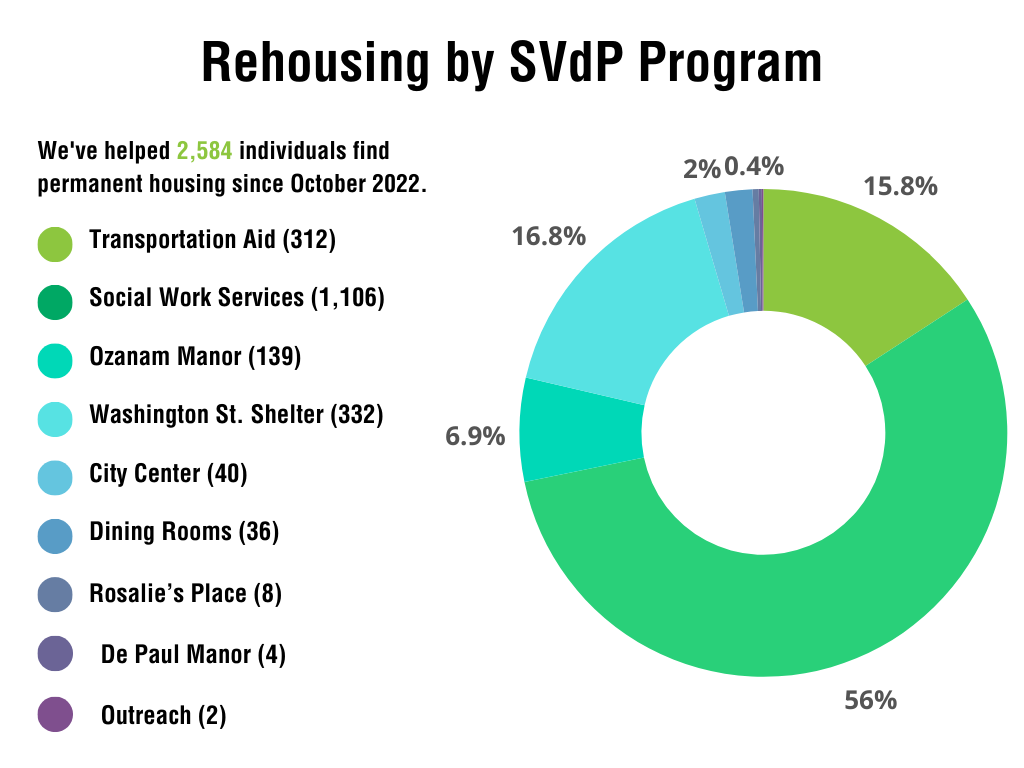
Paying for a move in...it's complicated
When St. Vincent de Paul talks about rehousing people, we often share about a person's progress toward stability and how we help move people into their new home summing up the finances part with "their deposit and rent was paid." People might imagine it's as easy as SVdP cutting a single check and handing it to the landlord or person/family we're rehousing.
Behind the scenes is a dizzying process of puzzle-piecing together enough money from different funding sources to meet the higher-than-normal move-in costs. It's a lot of "hurry up and wait."
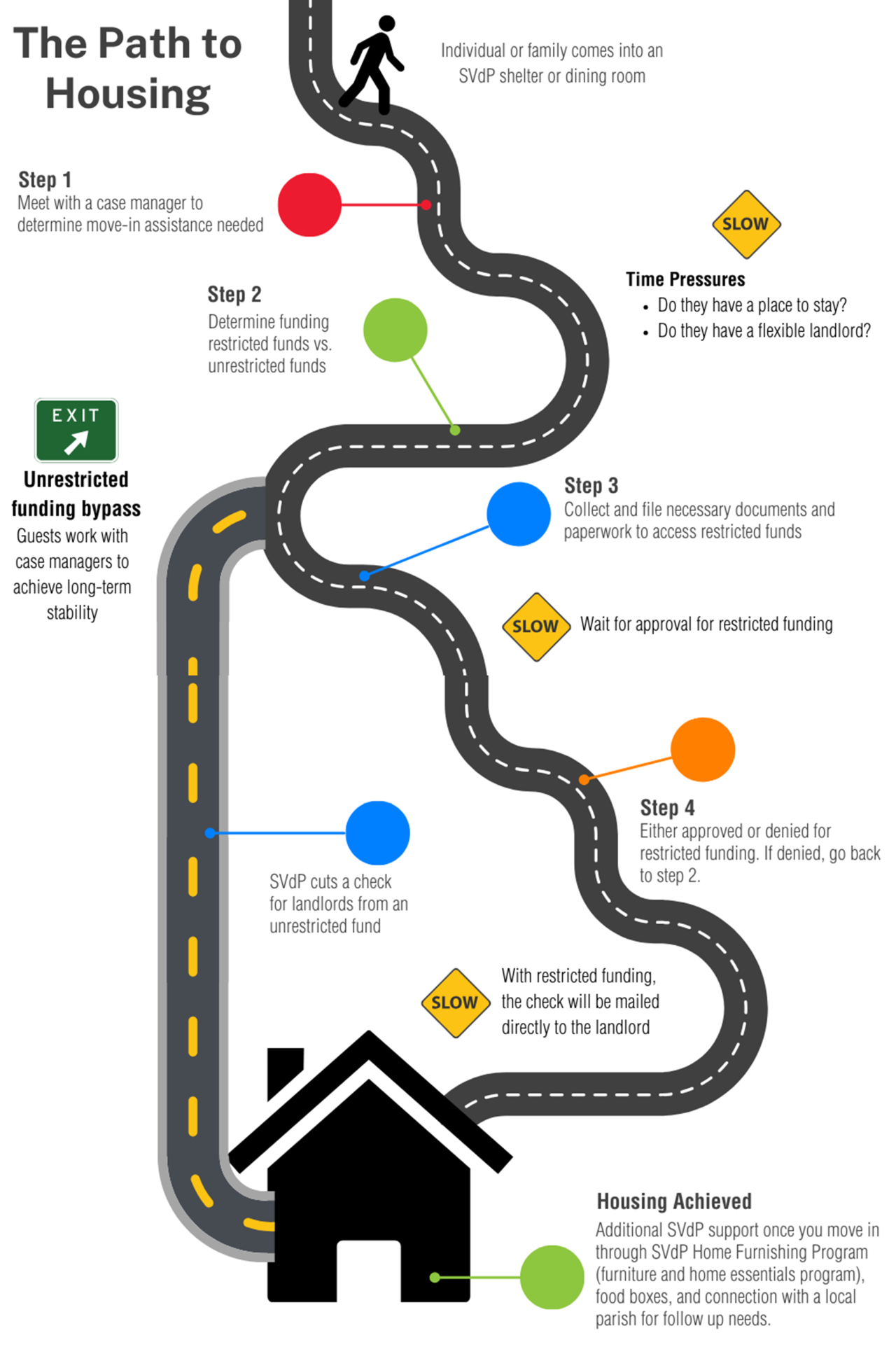
Fact: On average it costs SVdP $3,200 in move-in costs per rehousing case.
Housing Market Competition: Sometimes landlords can't or won't wait for the lengthy restrictive funding process and decide to move on to the next potential renter.
What Happens While People Wait? Usually, individuals or families stay on the street, at a shelter, or in their car. Hotel or motel stays are often out of reach financially. If they're lucky, they might have a friend or family member who puts them up for the couple of weeks it may take to get restrictive funding dispersed.
Overcoming History
Many of the people we're attempting to rehouse come with a rental history that landed them on the street in the first place (usually a past eviction). To get them back into housing often means paying off eviction debts and fees. With an eviction on record, people also face increased deposits and 1-3 months of rent in advance so landlords feel confident leasing to them.
Restricted vs. Unrestricted Funding
With different sources of funding come different requirements (or restrictions) to use that funding to help rehouse people. Unrestricted funding is open to SVdP's discretion and most helpful to individuals who don't check all the boxes to meet restricted funding.
Restrictions can include by are not limited to:
- Earmarking (designated for specific utilities, rent assistance only)
- Demographics (single parent or single income)
- Circumstances (length of time homeless, proof of pandemic-related eviction)
- Amount limits (only up to $1,500 per case, for example)
- Documentation (proof of ID, a signed lease, pay stubs)
Multiple Pots of Money
Life is rarely so clean cut. Each person who comes to us almost always has needs that can't be met entirely by restrictive funds. SVdP first applies restrictive funding where possible, then turns to multiple other funds to pay for remaining expenses.
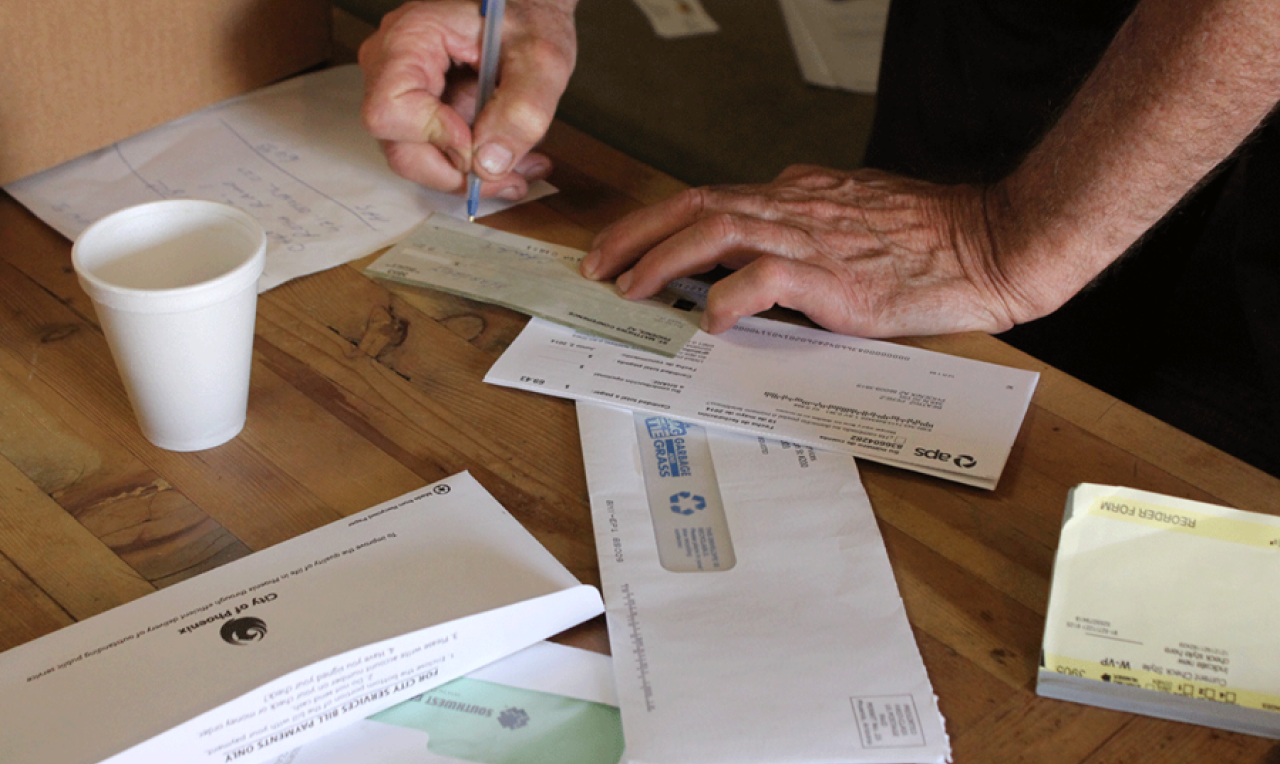
Our Process
For every one individual we move into permanent housing, we ALSO want to prevent 12 individuals from falling into homelessness. We know how we can reverse the homelessness ratio, but we can’t do it alone. We need community support to help us stop homelessness before it starts and build a future where no family or individual has to endure the trauma of losing their home.
Our goals for Homelessness Prevention
We will provide one-time rent, utility and mortgage support to families in need around Arizona through a centralized Homelessness Prevention team and more than 80 neighborhood service centers operated out of Catholic Churches by Vincentian volunteers throughout central and northern Arizona.
Our goals for Rehousing
We will continue to permanently rehouse individuals experiencing homelessness through our transitional housing shelters, social work services program, and Valley dining rooms.
Support the Housing 2025 fund
Over the last two years, our Housing 2025 initiative has generated over $300,000 in donations for St. Vincent de Paul to help families avoid and escape homelessness. While our Housing 2025 campaign fund is not our sole source of funding to help support homelessness prevention and response, it is the most flexible and often turned-to of the 20 fund currently available to cover move-in, rent, and utility assistance.
Watch the video below as SVdP Chief Program Officer Jessica Berg explains the importance of the fund and how much the fund has left to support individuals and families in need.
Stories of Progress...
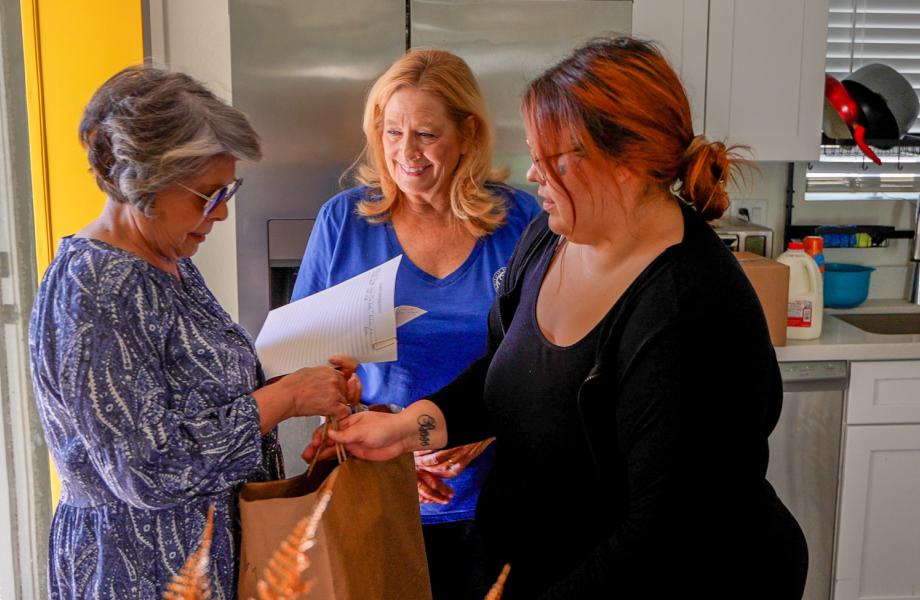
Lights on and food in fridge
SVdP was there for a single mom of six after car trouble caused her tight budget to fall short
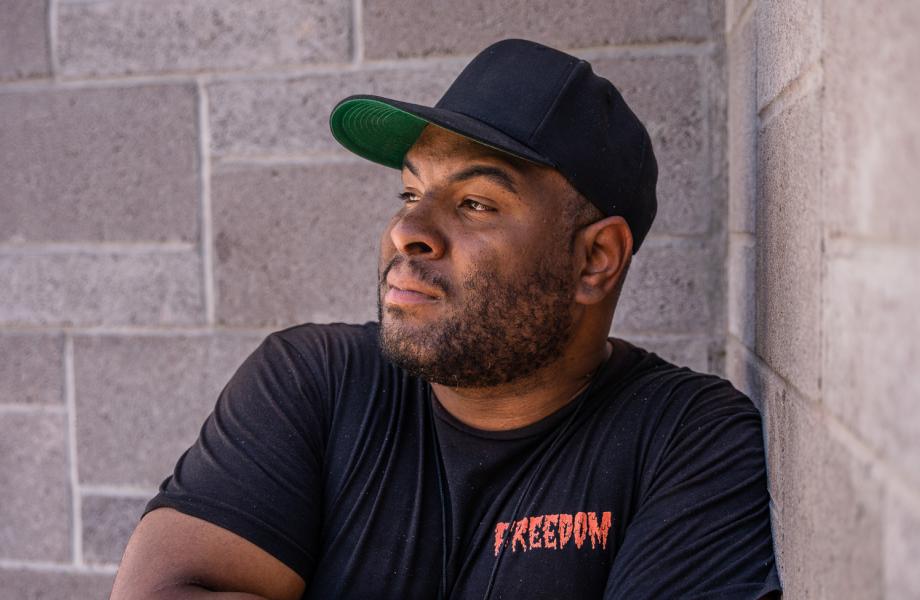
He visited for a meal, he left with housing
Diriki Lewis never expected housing help when he walked into Mesa Dining Room for a hot meal.
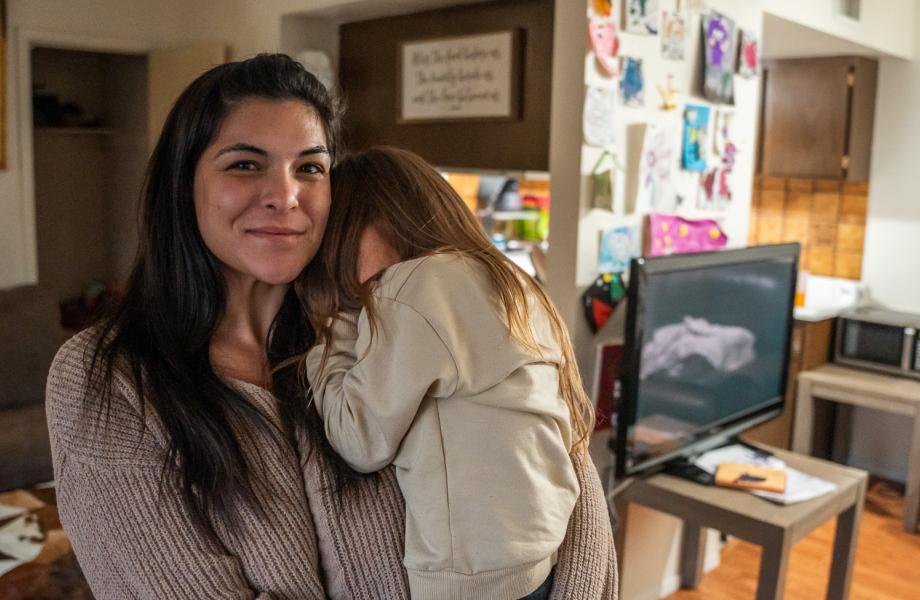
Keeping mother and daughter in the only home they’ve known together
SVdP’s rent assistance prevented Jessie Sandau and her daughter from losing their home
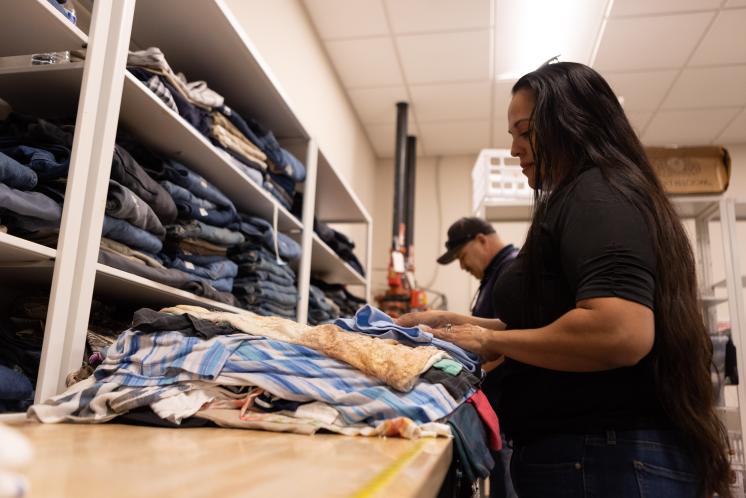
Volunteer
Experience the joy of service.
With a wide range of services across the Valley, there are many ways to share your time, talent and skills. Explore various service opportunities and find the right fit, whether you are volunteering alone, with your family or with a group!
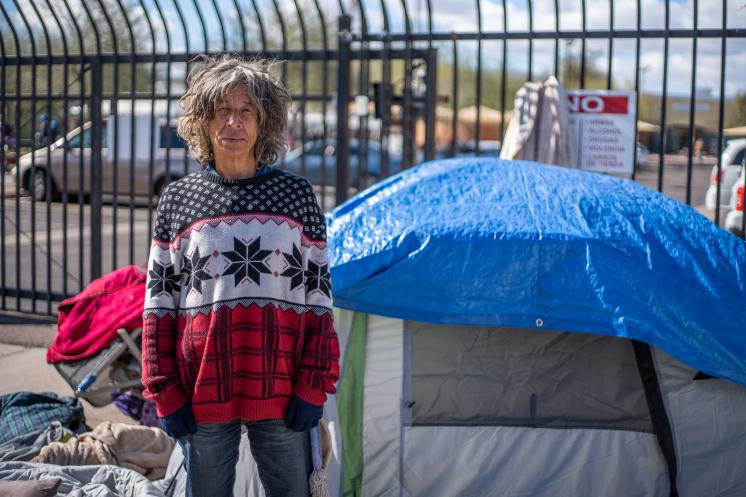
Latest Local Headlines
- More Maricopa County renters are facing the traumatic experience of eviction
- Their rent-controlled apartments were supposed to last another 10 years. Instead, they may only have months
- How Housing Costs Drive Levels of Homelessness
- How Much Do You Need to Earn to Afford a Modest Apartment in Your State?
- Study says the US is ill-prepared to ensure housing for the growing number of older people
- Seniors are flooding homeless shelters that can’t care for them
- Here's how much income Arizonans need to afford rent and what leaders are doing about it
- Tempe's clearing of homeless camps has ripple effects for Phoenix, aid workers
- Behind the numbers on the Valley's growing homeless population
Dig Deeper
These reads are a selection of additional resources recommended to learn more about homelessness in the community.

The Man in the Dog Park
Written by former NAU cultural anthropology professor Cathy A. Small, this book offers the reader a rare window into homeless life. Spurred by a personal relationship with a homelessness man, who co-authored the book, Smalls takes a compelling look at what homeless life is truly like.
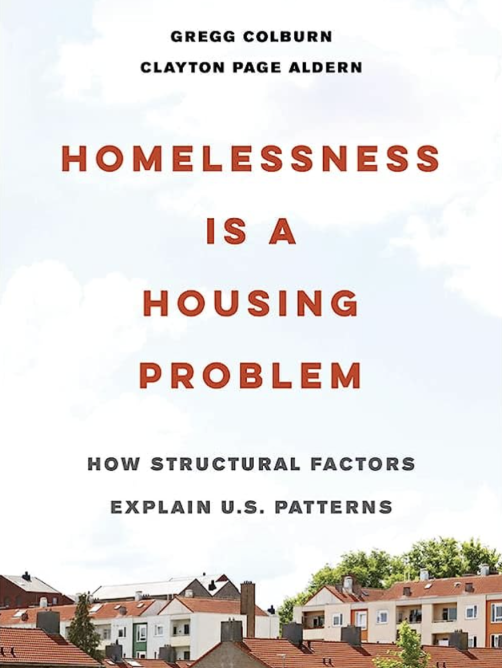
Homelessness is a Housing Problem
Housing scholar Gregg Colburn and data journalist Clayton Aldern seek to explain the substantial regional variations in rates of homelessness in cities across the United States.
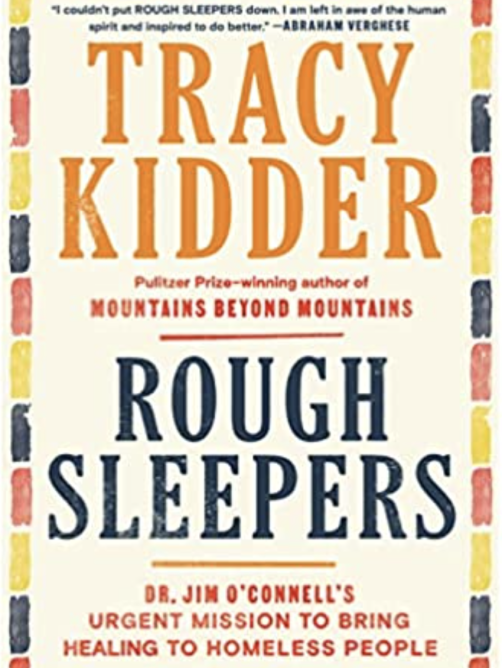
Rough Sleepers
The powerful story of Dr. Jim O’Connell who made a difference by helping create a program to care for Boston’s homeless community.
